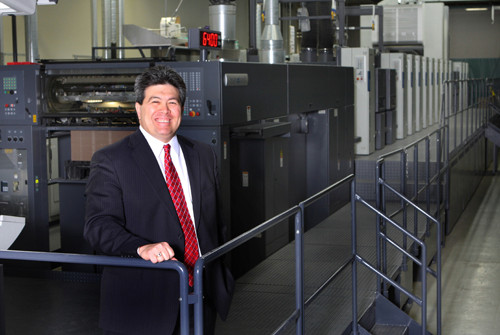
A former executive at printing and communications giants RR Donnelley and Quebecor World, Gary Stiffler formed the Matlet Group in 2005 after buying five companies in the printing, packaging and fulfillment industries, including Packaging Graphics in Pawtucket. Since then, Matlet and Packaging Graphics, which has about 210 full-time employees, have not only survived the recession but grown thanks to some key capital investments.
This past fall, Stiffler was the keynote speaker at the Greater New England Minority Supplier Development Council’s trade fair and expo, where he offered his perspective on being one of the larger minority-owned suppliers in the region.
Looking ahead, Stiffler hopes to use technology to improve some of the packages his company makes, such as the plastic clamshell, to make them easier to use and more environmentally friendly.
PBN: Since you formed The Matlet Group back in 2005, what has changed the most?
STIFFLER: The biggest change was that in a tough economy, we have been able to weather the storm very well and grow the business with some very well-timed capital investments in 2008. We got that in before the recession hit. We all tightened our belts for a few months, but we came out of that very strong and, in fact, we just finished our fiscal year and Packaging Graphics had a record year.
The most significant investment was a new printing press, which was designed by the press manufacturer and the graphics team. It is basically the only one of its kind in the world.
PBN: What are some of the niche markets that Packaging Graphics targets? PBN: As a company with operations in multiple states in different parts of the country, how does operating in Rhode Island compare to some of the other locations? PBN: From your perspective, is the business climate improving for minority-owned businesses? PBN: Do environmental concerns inform what you do at Packaging Graphics? PBN: Is there any way to keep the security features in those clamshell packages while making them a little easier to open? INTERVIEW
STIFFLER: The folding-carton market has become a fast-turnaround, highly complex type of packaging. One of the benefits we have at our facility is we can do pretty much everything in-house. We don’t have to outsource anything. Our customers can come in and have confidence we can get those types of things done – and on quick turnarounds. We’re not in competition with the large, corrugated, folding-carton makers who do multimillion runs. We’re into the more highly decorative, identify-it-quickly type of clients.
STIFFLER: I think Rhode Island in the past has not been known as a business-friendly state from a tax standpoint and areas like that. At the same time, we have a very strong work force, a very diverse work force. That’s the positive side of it. In Florida, there is a friendlier tax situation, but things like transportation are a challenge in Florida, because a lot of things leave the state but not as much comes in.
STIFFLER: We go out and sell and market our capabilities and services. It is not a sense of entitlement. Is it part of a sales tool we have? Yes. Because with a lot of larger corporations, and I will use Proctor & Gamble as the best example of that, they have a firm corporate belief that their employees are diverse and come in many colors and their customers globally are very diverse and come in many colors; therefore their suppliers should also be. And I think many corporations have come to realize that – yes, there is one thing about being cost-effective and shopping for price, and I can go to the big, behemoth suppliers and get that price and give them tons of volume – but if you are really after innovation and creation, small-business owners are the ones that live it every day.
Do I think there have been inroads? Yes. Do I think there is a long way to go? Yes.
STIFFLER: Absolutely. With all our clients, and our clients are Fortune 200 companies, sustainability is very important. At the same time they have to keep on top of how their package design is, because at the end of the day they have to sell a product. And you have to weigh that from a cost standpoint.
A couple things we have done is, we are one of five companies licensed in the United States with MeadWestvaco with a product they call Natralock. That product allows packaging clients to reduce the amount of PVC plastic content in their packaging and go to more of a paper-board type packaging and still be able to have security. A lot of the times a lot of the plastic content we do in thermaform is important from a security standpoint. You make those big clamshells that nobody can open because you don’t want product theft. So they are still trying to keep that along with then reducing the amount of PVC content.
STIFFLER: It’s challenging. I remember it was one of those things, when I first entered this business, I said I was going to change and they all laughed at me and said we will lose every client. You see some products out there – and we have done a few – where depending on the value of the product inside, they have perforated some of that clamshell so it is easier to rip. The higher value of the product, they don’t like to have it like that because it is too easy to rip and pick it up and put it in your pocket and be out the door. … With Natralock the paper is made in such a way that you really can’t tear it. You can’t tear the board and get into the package, so you can make the plastic much smaller. •
GARY STIFFLER
POSITION: CEO of The Matlet Group
BACKGROUND: With a background in computer science, Stiffler began as a systems analyst at RR Donnelley and has now worked in the printing industry for 30 years. In 2005, he formed The Matlet Group, which includes package-maker Packaging Graphics in Pawtucket as well as a printing business in Florida and a fulfillment company in St. Louis, Mo.
EDUCATION: Bachelor’s degree in business from Kent State, 1981; master’s in business administration from Ashland University, 1988
FIRST JOB: Small construction jobs with his father while in high school.
RESIDENCE: Franklin, Mass.
AGE: 54











